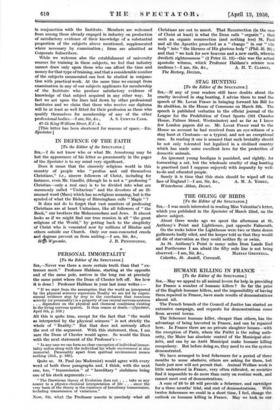PERSONAL IMMORTALITY
[To the Editor of the SPECTATOR.] Sut,—Never was there a more certain truth than that " ex- tremes meet." Professor Haldane, starting at the opposite end of the same pole, arrives in the long run at precisely the same point where the Dean of Chester left off. See how it is done 1 Professor Haldane in your last issue writes :—
" If we start from the assumption that the world as interpreted by the physical sciences represents Reality we are led by experi- mental evidence step by step to the conclusion that conscious activity (or personality) is a property of our central nervous systems
. . dependent on the physical and chemical conditions existing • in the living nervous system. It thus ceases at death.—(Speclator, April 5th, p. 559.)
All this is quite true, except for the fact that " the world as interpreted by the physical sciences " is not strictly the whole of " Reality." But that does not seriously affect the rest of the argument. With this statement, then, I am sure the Dean of Chester would agree. So would the Dean with the next statement of the Professor's :- " In any case we can form no clear conception of individual immor- tality unless along with the individual his whole environment is also immortal. Personality apart from spiritual environment means nothing (ibid., p. 560).
Quite so. St. Paul (no Modernist) would agree with every word of both these paragraphs and, I think, with the next one, too, " transmission " of " hereditary " sinfulness being one of his stock arguments :-
" The Darwinian theory of Evolution does not . . . take us any nearer to a physico-Chemical interpretation of life . . . since the very basis of the theory is the existence of hereditary transmission, including transmission of variations."
Now, Sir, what the Professor asserts is precisely what all Christians are out to assert. That Resurrection (in the case of Christ at least) is what the Dean calls " organic " ; that such an organic resurrection (and nothing less) St. Paul and all the Apostles preached as a " change " in our " vile body" into ". the likeness of His glorious body" (Phil. ill. 20) ; and, that " we look for new heavens and a new earth, wherein dwelleth righteousness " (2 Peter iii. 18)—this was the actual apostolic witness, which Professor Haldane's science now


























































 Previous page
Previous page